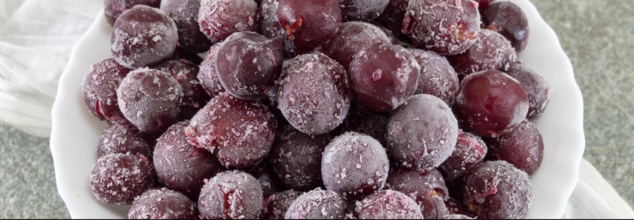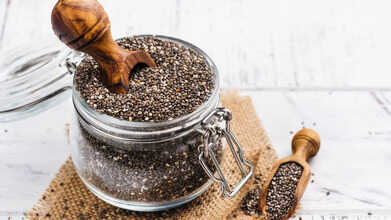- Health Conditions A-Z
- Health & Wellness
- Nutrition
- Fitness
- Health News
- Ayurveda
- Videos
- Medicine A-Z
- Parenting
- Web Stories
Chill Out! This Frozen Secret Will Stop You From Stress Eating

Chill Out! This Frozen Secret Will Stop You From Stress Eating
Stress eating is a familiar habit for many of us, as we often turn to comfort foods during challenging moments. When stress strikes, the body craves soothing sensations, leading to impulsive choices that are often high in sugar or fat. While these foods might offer temporary relief, they also come with long-term consequences.
However, Dr Jason Singh, a primary care physician in Virginia, offers a refreshing alternative to typical stress eating: frozen grapes. With a blend of science and practicality, this method not only satisfies cravings but also provides a host of physical and mental health benefits.
Why Do People Stress Eat?
When under stress, the body releases hormones like cortisol, which can intensify hunger and cravings, particularly for high-energy foods that offer quick satisfaction. Stress eating, therefore, becomes a quick fix that provides temporary relief, with comfort foods creating a “reward” by releasing dopamine—a neurotransmitter that promotes pleasure.
Unfortunately, this cycle often leads to overeating and emotional dependency on food as a coping mechanism. Healthy alternatives, like frozen grapes, can help manage this urge without compromising health.
Dr Singh recommends using frozen grapes as a way to manage stress-induced cravings. This approach is more than just a substitute for sugary snacks; it’s a scientifically-backed method that triggers pleasure and relaxation responses in the brain.
Here’s how it works:
1. TRPM8 Receptors and Dopamine Release
When a frozen grape melts in your mouth, the cold sensation activates transient receptor potential melastatin subtype 8 (TRPM8) receptors. These receptors, typically activated by cool temperatures, initiate a pleasurable response by releasing dopamine—a neurotransmitter linked with feelings of reward and pleasure. This reaction can mimic the “high” people seek during stress, making frozen grapes a powerful alternative to unhealthy snacks.
2. Anti-Inflammatory Effects and Stress Relief
TRPM8 activation also suppresses the release of CGRP, a neuropeptide that depletes dopamine in the brain. By reducing CGRP levels, frozen grapes help maintain dopamine levels, keeping you feeling satisfied and relaxed. They also boost interleukin-10, an anti-inflammatory protein that helps the body respond more effectively to stress, reducing inflammation and enhancing your mood.
3. Impact on the Parasympathetic Nervous System
The cooling sensation from frozen grapes doesn’t just make you feel refreshed; it actually activates the parasympathetic nervous system, which is responsible for “rest-and-digest” functions. This leads to a decrease in heart rate, lowered blood pressure, and reduced cortisol levels, allowing your body to relax and enter a state of calm. In this way, frozen grapes do more than satisfy cravings—they also contribute to overall stress reduction.
4. Fullness and Satiety
Finally, the simple act of chewing frozen grapes helps trick the brain into feeling satisfied. The chewing motion stimulates the salivary glands, creating a sensation of fullness that can help prevent further cravings. Grapes are relatively low in calories, with a cup containing only 62 calories, making them a guilt-free snack for those looking to control their weight.
Health Benefits of Grapes
Frozen grapes are not only a delicious treat but also pack a wealth of health benefits. Here’s a closer look at why you should consider adding frozen grapes to your diet:
- Frozen grapes are a guilt-free treat, with only about 62 calories per cup. They are hydrating and satisfying, making them an excellent alternative to high-calorie snacks, especially for those looking to manage their weight.
- Grapes are packed with antioxidants, particularly resveratrol, which supports heart health by reducing inflammation and protecting against oxidative stress. Frozen grapes retain these beneficial compounds, offering a nutritious boost to your diet.
- The cold temperature of frozen grapes can help activate TRPM8 receptors in the mouth, leading to the release of dopamine and promoting relaxation. This cooling sensation can also trigger the parasympathetic nervous system, reducing stress and calming the body.
How to Make Frozen Grapes
Making frozen grapes is simple and requires minimal effort.
- Start by washing fresh grapes thoroughly under cool water to remove any dirt or residue.
- Pat them dry with a clean towel.
- Next, spread the grapes in a single layer on a baking sheet lined with parchment paper, ensuring they don’t touch each other.
- Place the baking sheet in the freezer for about two to three hours, or until the grapes are completely frozen.
- Once frozen, transfer the grapes to a resealable bag and enjoy as a refreshing snack.
Frozen grapes are more than just a refreshing snack—they’re a scientifically supported way to curb stress-induced cravings. With benefits ranging from dopamine release to stress reduction, they offer a tasty and healthy alternative to traditional comfort foods. So, the next time you feel the urge to stress eat, reach for some frozen grapes and let their cool, calming effects work their magic on your mind and body.
Croissant In a Gut-Friendly Food, Says NHS Surgeon

Credits: Insta and Canva
Whenever we have to think of a quick food, we think of breads. However, we are usually advised against it, but Dr Karan Rajan, NHS Surgeon has a different view to offer. He says that croissant, if made in the traditional way could actually be a gut-friendly food. “This is my legal argument to explain why croissants should be considered a gut health food. It has to be a traditional croissant because it is made using laminated yeast dough that undergoes slow fermentation. This process allows the yeast and lactic acid bacteria to partially break down some of the starches, making the final product easy to digest compared to under-fermented white bread,” he said.
What Is The Right Way To Have A Croissant?
He suggests that if you let a baked croissant cool down before eating, it helps turn the starch into resistant starch. This, also helps feed the bacteria in the colon. “A croissant eaten mindfully for breakfast allows the body to lessen its said,” he said.
So, Is Croissant Really Better Than Regular Bed?
Experts have suggested that when dough ferments, natural bacteria and yeast partially break down the starches and gluten. This also makes the final product easier to digest and gives it a unique flavor.
Whether or not the croissant is healthy really depends on the way it is made. If the croissant is fermented, it is gut-friendly, otherwise, it is not.
What Should People Keep In Mind?
People must go for fermented bread, as it is easier on the stomach. This is especially good for those who feel bloated after consuming regular bread. The fermented bread will also have a lower glycaemic effect, which means they cause a slower rise in blood sugar as compared to unfermented or regular bread. It is also important to note portion control, however, warn experts.
However, one must keep in mind that while most people can have fermented breads, it should be consumed in moderation.
Are There People Who Cannot Have This Gut-friendly Food?
People with celiac disease or serious gluten intolerance should stay away from them. This is because not always does fermentation remove all the gluten. However, fermented options could be better for those struggling with diabetes, however it should still be eaten in moderation.
What one must keep in mind is that fermented breads are smarter treats, but mot an everyday meal. For everyday meal, try to balance it with whole grains, millets, and high-fibre foods.
Dr Ulysses Wu, MD, with Hartford HealthCare also noted that sourdough, which is also a type of fermented bread could have potential health benefits.
“The long fermentation process partially breaks down gluten and phytic acid, a compound that could block mineral absorption. For many people, that makes sourdough easier on the stomach,” Dr. Wu notes.
The fermentation process, he says could lower glycemic index, which could help with blood sugar control. Furthermore, it is high in prebiotics, which can act like fuel for the healthy bacteria already in your gut.
However, he also notes that fermentation does not fully remove gluten, so it must be consumed in moderation.
8 Cups Of This Drink Can Help Increase Your Longevity But More Than That Could Increase Your Risk Of Heart Diseases

(Credit-Canva)
One of the major point of conversations right now is longevity. People are learning day by day about what may affect their biological age and how, why and which way they can lower it. Many studies have pointed out that things like sugar, and some drinks may lower it, however, a new study shows that there may be some unexpected heroes among our daily drink consumption.
A study recently published in the British Journal of Nutrition showed something interesting: drinking about seven to eight cups of tea, coffee, and plain water every day might help you live longer.
Researchers looked at the drinking habits of over 182,000 people and found that hitting this total number of drinks, when balanced well, offered the best protection. It lowered the risk of dying from all kinds of serious problems, including cancer and heart disease. The main finding is that the mix of drinks is key—it's not good to overdo it, as too much might actually be bad for your heart.
How Do Tea, Coffee Or Water Help Your Health?
The research figured out the best possible way to combine these drinks to get the most health benefit:
Optimal Daily Total
The number one rule is to drink a total of seven to eight beverages every day. This total includes your water, coffee, and tea.
Coffee and Tea Ratio
Once you're hitting that daily goal, the best way to mix the coffee and tea is in a 2:3 ratio. This means for every two cups of coffee, you should have three cups of tea. This specific blend was found to be the most powerful for protecting you against dying from heart problems, cancer, and diseases of the lungs and stomach.
Hydration
The experts stress that the most important thing is to just stay hydrated first. Get your total number of drinks up to seven or eight. After you've done that, then you can start swapping some of your water for the healthier mix of coffee and tea.
How Much Tea Or Coffee Should You Drink?
The study also came with important warnings about drinking too much or too little of the mix:
If You Drink Very Little: If you currently have less than four total drinks a day, just adding a cup of coffee or tea won't help much. You need to focus on drinking more water first to reach the main goal of being fully hydrated.
If You Drink Too Much: If you are drinking nine or more cups of fluid a day, replacing water with more tea or coffee could actually raise your risk of dying from heart disease. More is not always better! Finally, the scientists noted two important things:
They can only say there's a link (an observation) between the drinks and living longer; they can't say for sure that the drinks are the direct cause of longer life. The study didn't know how people prepared their drinks—whether they added a lot of sugar or milk, which could affect the health benefits. The main takeaway is to focus on getting your overall daily fluid intake to seven to eight drinks and then use the beneficial mix of coffee and tea wisely.
Is It Safe to Eat Chia Seeds During Pregnancy? Expert Explains

Credits: Canva
Pregnancy is a unique and exciting journey, full of changes, decisions, and the constant desire to give your baby the best start in life. Nutrition becomes particularly important during this time, as what a mother eats can impact both her own health and the development of her baby. One ingredient that has been gaining popularity among expectant mothers is chia seeds.
Though tiny, these seeds are packed with nutrients and can be a versatile addition to a pregnancy diet. To understand their benefits, we spoke with Dr. Deepa, Senior Consultant at Yashoda Super Speciality Hospital Kaushambi, who shared how chia seeds can support maternal and fetal health.
Benefits of Chia Seeds for Pregnant Women
Chia seeds are simple to incorporate into daily meals as you can sprinkle them on oatmeal, mix them into yogurt, blend them into smoothies, or even add them to baked goods.
Their mild taste and texture make them easy to enjoy, which is one reason why many pregnant women are turning to these seeds. According to Dr. Deepa, there are several ways chia seeds can help during pregnancy:
Supports Digestion
Constipation and other digestive issues are common during pregnancy due to hormonal changes and slower digestion. Chia seeds are high in soluble fibre, which can help regulate bowel movements. When soaked in liquid, they expand into a gel-like texture that aids digestion and promotes a feeling of fullness. This not only helps prevent overeating but also supports healthy weight gain, which is important for both mother and baby.
Helps Maintain Blood Sugar Levels
Fluctuating blood sugar levels can be a concern for expectant mothers, sometimes leading to gestational diabetes. The fibre in chia seeds slows sugar absorption into the bloodstream, helping to maintain stable blood sugar and energy levels. By including chia seeds in meals, pregnant women may reduce the risk of sudden sugar spikes and maintain steadier energy throughout the day.
Aids Hydration
Hydration is essential during pregnancy, and chia seeds can play a supportive role. Dr. Deepa points out that chia seeds are versatile and can be added to a wide variety of dishes, from smoothies and salads to yogurt or baked recipes. When mixed with water or other liquids, they absorb moisture, helping to keep the body hydrated and supporting overall wellness.
Nutritional Power for Mother and Baby
Although small, chia seeds are a nutritional powerhouse. They are rich in omega-3 fatty acids, fibre, protein, calcium, and antioxidants. These nutrients support brain development in the fetus, improve digestion, help maintain healthy blood sugar levels, and contribute to overall maternal health.
Dr. Deepa recommends consuming chia seeds in moderation. Eating too many may cause digestive discomfort due to their high fibre content. A typical portion is about one to two tablespoons per day. She also emphasizes that pregnant women should consult their healthcare provider before making significant dietary changes, especially if they have pre-existing medical conditions.
Including chia seeds as part of a balanced, varied diet can help pregnant women feel nourished, support digestion and hydration, and provide essential nutrients for their growing baby. With their versatility and health benefits, chia seeds are a convenient and powerful addition to a pregnancy-friendly diet.
© 2024 Bennett, Coleman & Company Limited

